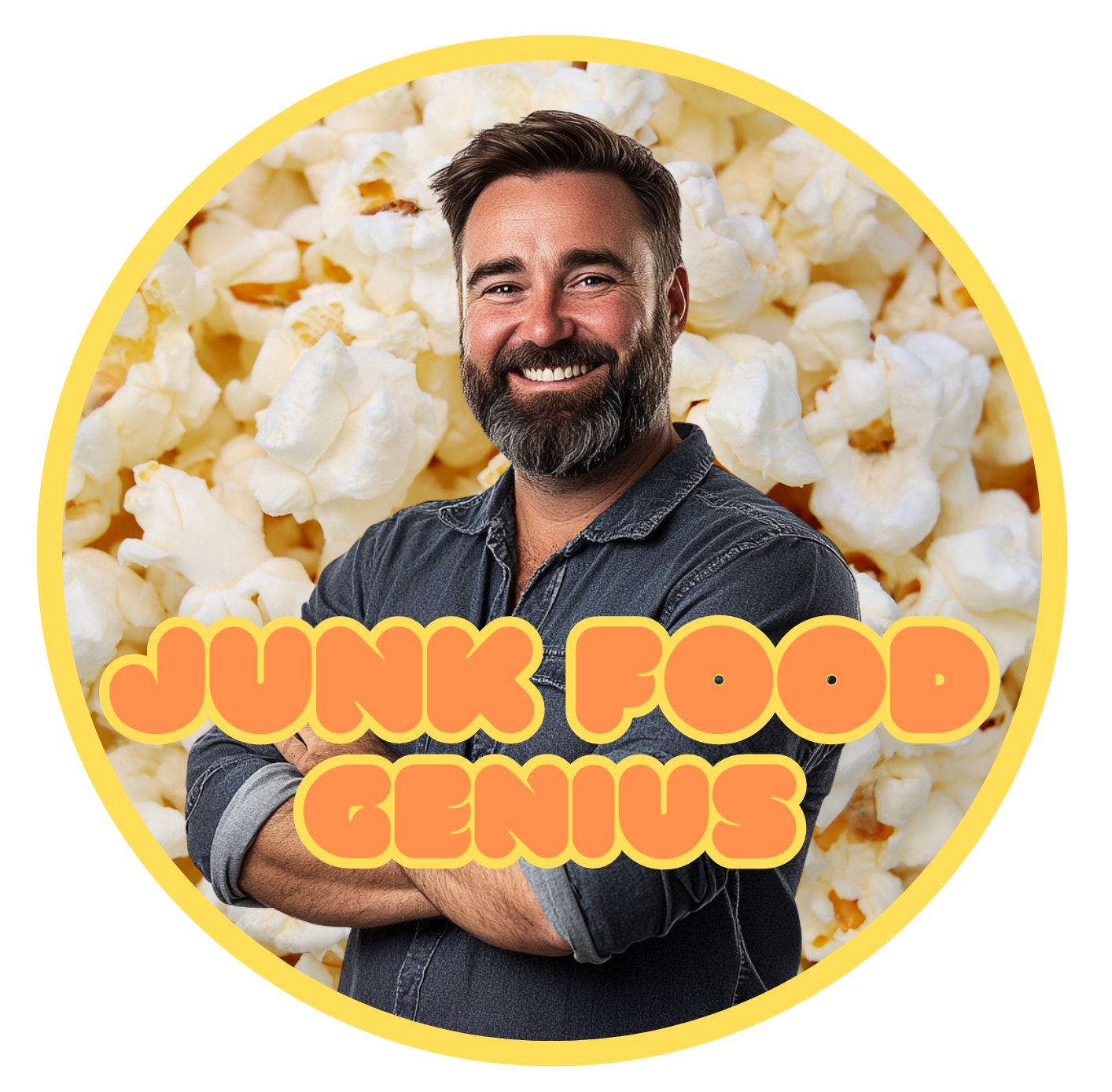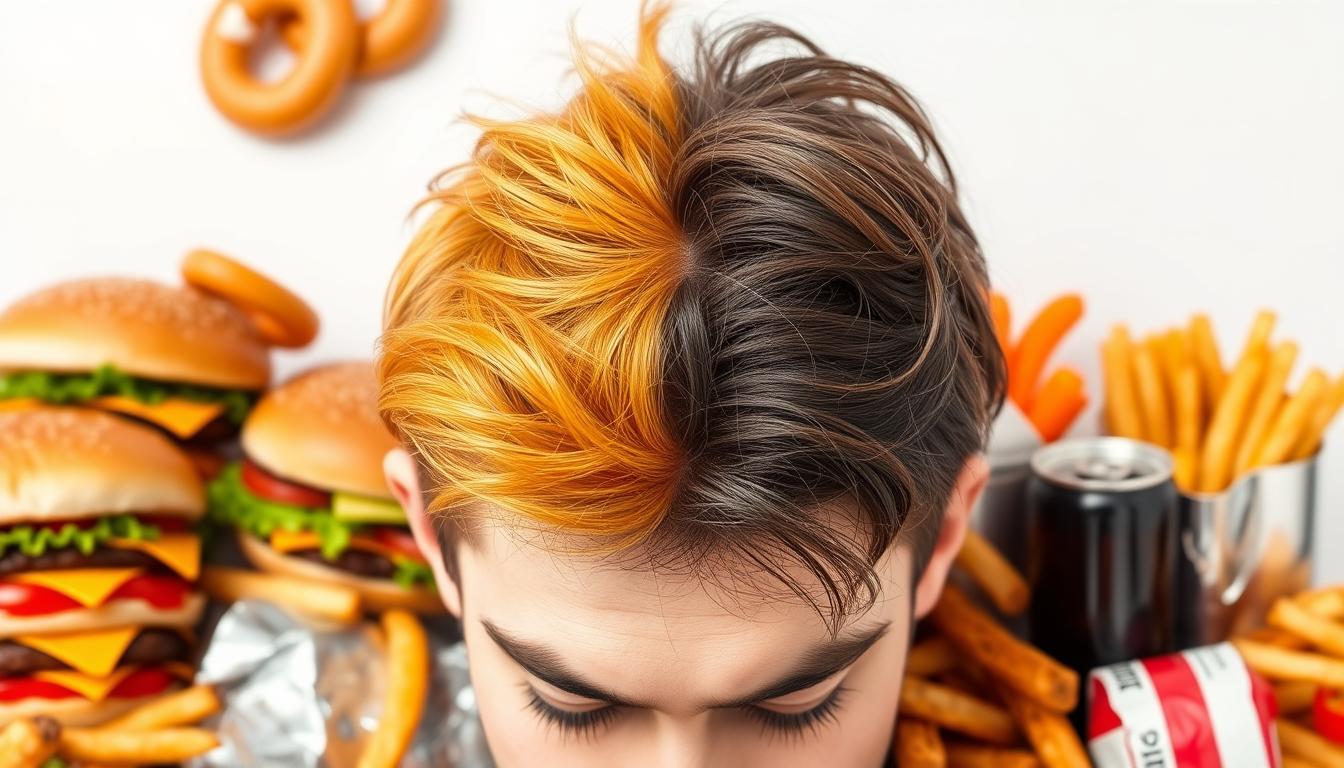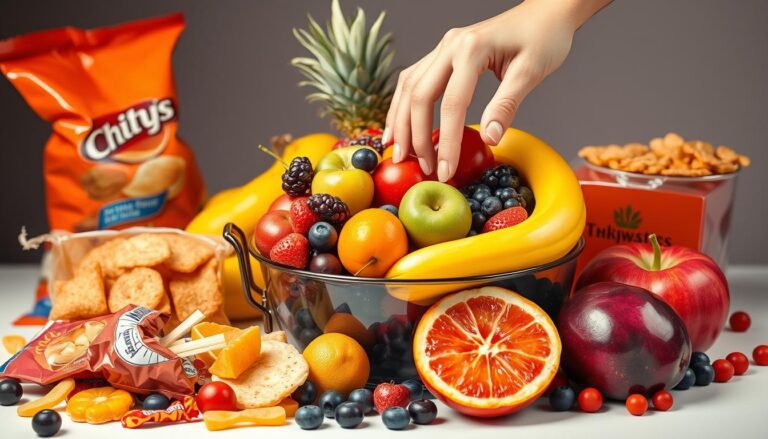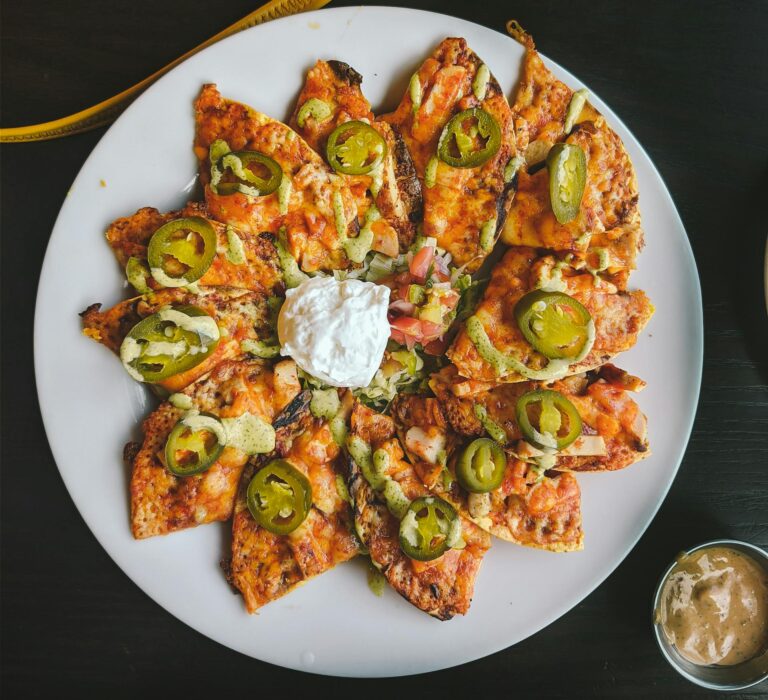Can Eating Junk Food Affect Your Hair Growth? The Surprising Connection
Many people don’t see how their diet affects their hair. They wonder: Does eating junk food harm hair growth? The truth is that research shows what we eat is very important.
Here’s the Straight Dope… A diet full of processed foods can lead to missing out on key nutrients. These nutrients, like iron and zinc, are vital for healthy hair. Too much junk food can cut down on these important elements. Iron deficiency, for example, is a common cause of hair loss worldwide.
So yes, there is a correlation between the two, and learning more about this link can help us make better choices for our hair and overall health.
After all, Junk Food will always be in our lives. So it’s about learning how to live with it — even still enjoy it — but do it with moderation and knowledge.
Key Takeaways
- Nearly 50% of individuals face pattern hair loss by age 50.
- A significant correlation exists between iron deficiency and hair loss.
- Vegans and vegetarians are at a higher risk for nutritional deficiencies that can affect hair.
- Zinc plays a critical role in maintaining hair health, with low levels linked to several hair conditions.
- Maintaining adequate hydration is essential for supporting healthy hair follicles.
Understanding Hair Growth Basics
Hair growth is a complex process. It involves the hair growth cycle, which shows how hair grows, matures, and sheds. This cycle has three main phases: anagen, catagen, and telogen. Knowing this cycle helps us understand hair loss.
The Hair Growth Cycle
The hair growth cycle has three phases:
- Anagen: This is the active growth phase. Hair follicles get nutrients for healthy hair. It can last several years, adding to hair length.
- Catagen: It’s a short transitional stage. Hair growth slows, and the follicle shrinks.
- Telogen: This is the resting phase. Hair sheds, making way for new growth. Losing 50 to 100 hairs daily is normal.
Factors Influencing Hair Growth
Many factors affect hair growth. Genetics and hormonal balances are key. Hormonal imbalances can cause thinning in both men and women.
Environmental factors and lifestyle choices also play a role. Diet is crucial. High-fat diets can lead to obesity, causing hair loss.
Importance of Nutrients for Healthy Hair
Proteins, vitamins, and minerals are vital for hair health. Iron and zinc support hair follicles. A diet rich in healthy fats promotes hair growth.
But, too much refined carbs or sugar harms hair health. It’s important to eat a balanced diet.
Unpacking Junk Food: What Is It?
It’s important to know what junk food is to understand its effects on health and hair. Junk food is high in calories but low in nutrients. It includes tempting items that don’t really benefit our bodies.
Common Types of Junk Food
Many types of junk food are common in homes. Here are some examples:
- Fast food (burgers, fries, pizza)
- Sugary beverages (sodas, energy drinks)
- Processed snacks (chips, candy, pastries)
- Instant meals (frozen dinners, ramen noodles)
Nutritional Value of Junk Food
Junk food often has very little nutritional value. It lacks important vitamins and minerals. Instead, it’s filled with unhealthy fats, sugars, and preservatives. These ingredients can harm our health and hair quality.
How Junk Food Fits into Our Diet
Junk food is a big part of the average American diet. It leads to unhealthy eating habits. Eating too much of it can cause nutrient deficiencies, affecting our health and hair. It’s key to balance junk food with healthier choices for our well-being.
| Type of Junk Food | Calories | Key Nutrients Lacking |
|---|---|---|
| Fast Food | High | Vitamins A, C, and fiber |
| Sugary Beverages | Very High | Calcium and iron |
| Processed Snacks | Moderate to High | Essential fatty acids |
| Instant Meals | High | Protein and micronutrients |
Impact of Junk Food on Overall Health
Junk food has a big impact on our health. Eating poorly can lead to obesity, diabetes, and heart disease. These problems can also harm our hair.
It’s important to know how vitamins and minerals help our bodies. This knowledge helps fight the bad effects of junk food.
Link Between Nutrition and Health
Eating right is key to staying healthy. Junk food can cause nutrient deficiencies. This can hurt our bodies and minds.
For example, too much sugar can harm hair follicles. This can cause hair to thin. Making better food choices is important.
Long-Term Effects of Poor Diet
Eating junk food for a long time can cause big problems. It can lead to weight gain and health issues. Foods lacking in nutrients can damage cells and cause hair loss.
Genetics and lifestyle also play a role. But, a good diet can help fight these effects.
The Role of Vitamins and Minerals
Vitamins and minerals are vital for healthy hair and body. Lack of iron, vitamin C, and zinc can cause hair loss. Getting the right nutrients can help even when other factors are normal.
Having the right balance of nutrients is key. It helps our health and supports hair growth.
| Nutrient | Benefits for Hair Health | Food Sources |
|---|---|---|
| Iron | Boosts circulation and oxygen delivery to hair follicles | Red meat, lentils, spinach |
| Vitamin D3 | Supports the hair growth cycle | Fatty fish, fortified dairy products |
| Zinc | Promotes hair tissue growth and repair | Nuts, seeds, whole grains |
| Omega-3 Fatty Acids | Reduces inflammation and supports scalp health | Salmon, walnuts, flaxseeds |
How Does Diet Affect Hair Health?
Diet and hair health are closely linked. A balanced diet is key to healthy hair growth. On the other hand, junk food can harm your hair.
Essential Nutrients for Hair Growth
Vitamins and minerals are vital for hair health. Lack of certain nutrients, like iron or biotin, can affect hair. Foods rich in vitamins A, C, D, and E, along with omega-3 fatty acids, nourish hair follicles.
Importance of Protein and Iron
Protein and iron are crucial for hair. Protein builds keratin, the main hair component. Iron helps hair follicles get oxygen. Without enough, hair becomes weak and breaks easily.
Iron-rich foods like spinach and lean meats are essential. They help keep hair healthy and prevent shedding.
Role of Omega-3 Fatty Acids
Omega-3 fatty acids promote a healthy scalp and reduce inflammation. Foods like salmon and walnuts are rich in these fats. They help create an ideal environment for hair growth.
A diet rich in whole foods and nutrients is best for hair. Focus on protein, iron, and omega-3 fatty acids. This will lead to stronger, healthier hair.
| Nutrient | Sources | Benefits for Hair |
|---|---|---|
| Protein | Lean meats, eggs, beans | Strengthens hair structure, promotes growth |
| Iron | Spinach, lentils, red meat | Improves blood flow to follicles, prevents brittleness |
| Omega-3 Fatty Acids | Salmon, walnuts, chia seeds | Reduces inflammation, supports scalp health |
| Biotin | Sweet potatoes, almonds, bananas | Reduces hair loss, strengthens strands |
| Vitamin E | Olive oil, almonds, avocados | Repairs tissue, promotes healthy follicles |
| Vitamin C | Citrus fruits, tomatoes, broccoli | Protects follicles from damage, aids in collagen production |
Junk Food’s Effect on Hair Loss
Research and personal stories show a link between junk food and hair loss. Many worry about how their diet affects their hair. Studies show junk food can lead to hair thinning and loss, highlighting the dangers of bad nutrition.
Evidence from Studies
Studies link junk food to hair loss. As junk food intake goes up, so does hair thinning. In the U.S., 36.6% of adults eat fast food daily, missing out on vital nutrients for hair.
Children and teens also eat fast food daily, with 36.3% doing so between 2015 to 2018. Foods high in sugars and sodium cause inflammation and hair loss.
Mechanisms Behind Hair Thinning
Junk food harms hair follicles by lacking nutrients like iron and biotin. Hair needs protein, so a low-protein diet weakens it. Meals high in carbs slow down hair growth.
Personal Stories and Anecdotes
People share how junk food diets hurt their hair. Switching to healthier foods improves hair thickness and shine. Their stories back up research, showing diet’s key role in hair health.
| Food Type | Nutritional Content | Impact on Hair Health |
|---|---|---|
| Fast Food Meals | High in sugar and sodium | Nutrient deficient; linked to hair loss |
| Sugary Drinks (ex. Coca-Cola) | 140 calories, 39g sugar per 12 oz | Contributes to inflammation, affecting hair growth |
| High-Protein Foods | Essential for hair shaft composition | Promotes hair strength and growth |
| Vegetable Oils (high in Omega-3s) | Supportive for scalp health | Encourages hair health and combats thinning |
The Connection Between Stress and Diet
Understanding the diet-stress connection is key to seeing how food affects our minds. Eating junk food can make us rely on unhealthy eating, increasing stress. A bad diet can cause anxiety and depression, harming both our mental and hair health.
How Poor Diet Leads to Stress
Eating junk food often means we miss out on important nutrients. This can make us feel more stressed and anxious. Without the right vitamins and minerals, our bodies can’t work well, leading to more emotional problems.
The Impact of Stress on Hair Growth
Stress has a big effect on hair growth. High stress can cause hair loss, like telogen effluvium, where hair stops growing. This happens because our bodies can’t give hair the nutrients it needs when stressed.
Managing Stress for Healthy Hair
To keep hair healthy, we need to manage stress well. Eating right, with protein and complex carbs, helps hair grow and keeps stress down. Practices like meditation or yoga can also help us stay calm. Changing our diet can make us feel better and keep our hair strong.
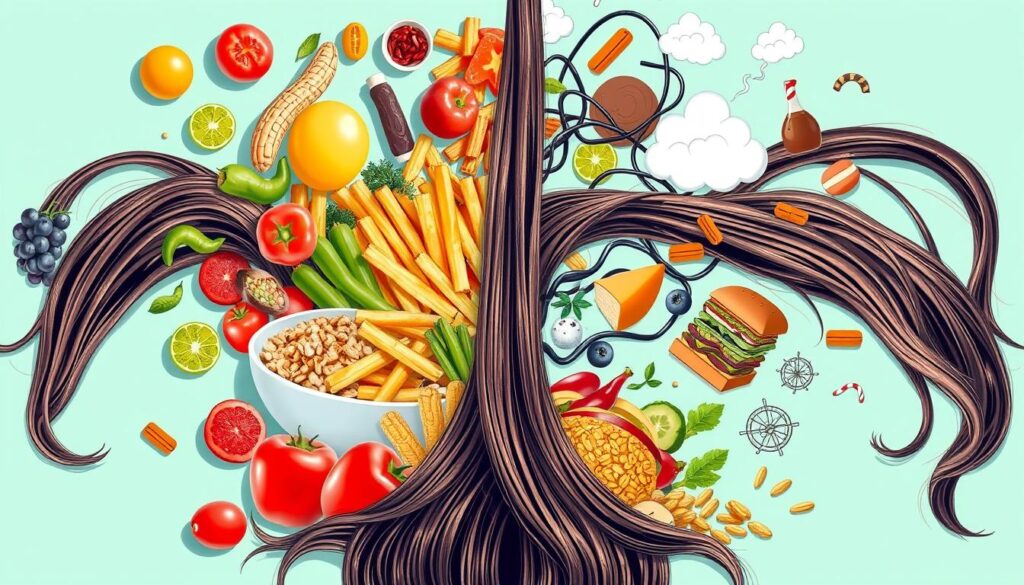
The Role of Hydration in Hair Health
Drinking enough water is key for hair health. It keeps your body and hair healthy. Water helps move nutrients and control body temperature. Without it, hair can suffer.
Importance of Drinking Water
Water is vital for hair cells. It keeps hair elastic and strong. Without enough water, hair becomes brittle and breaks easily.
Dehydration and Its Effects on Hair
Dehydration harms hair a lot. It makes hair dull, dry, and frizzy. It can also lead to scalp problems and hair loss.
Simple Ways to Stay Hydrated
There are easy ways to stay hydrated. This improves hair health. Here are some tips:
- Set a daily water goal, aiming for at least eight 8-ounce glasses.
- Incorporate hydrating foods into your diet, such as cucumbers, watermelons, and oranges.
- Carry a reusable water bottle to remind yourself to drink throughout the day.
- Establish a routine to drink a glass of water before each meal.
- Infuse your water with fruits or herbs for added flavor, making it more enjoyable to consume.
| Hydration Tips | Benefits |
|---|---|
| Daily Water Goal | Promotes optimal hydration |
| Hydrating Foods | Provides additional moisture |
| Carry a Water Bottle | Encourages consistent sipping |
| Pre-meal Water Intake | Supports digestion and hydration |
| Flavoring Water | Makes hydration enjoyable |
By following these tips, you can boost your hydration. This will make your hair look and feel better.
Balanced Diet: Key to Healthy Hair
A balanced diet is crucial for hair health and growth. Different food groups offer essential nutrients for well-being. Eating whole foods rich in vitamins and minerals is key for hair nourishment.
What Constitutes a Balanced Diet?
A balanced diet includes various food groups for essential nutrients. It includes:
- Fruits and vegetables for vitamins and antioxidants
- Whole grains for energy and fiber
- Lean proteins for building hair structure
- Healthy fats, which promote microcirculation
Food Groups That Promote Hair Growth
Adding specific food groups to your meals can boost hair health:
- Lean Proteins: Chicken, fish, legumes, and tofu strengthen hair. Aim for a palm-sized portion at each meal.
- Iron-Rich Foods: Dark leafy greens, red meat, and iron-fortified products prevent hair shedding due to iron deficiency.
- Healthy Fats: Omega fatty acids in salmon, avocados, and coconut oil stimulate blood flow to hair follicles, promoting growth.
- Fruits and Veggies: These foods ensure enough Vitamin intake, including B12, C, D, and E, vital for hair vitality.
- Calcium Sources: Dairy, almonds, and leafy greens support hair structure and prevent breakage.
Sample Meal Plan for Hair Health
Creating a meal plan for hair health can be fun. Here’s a simple plan to inspire better dietary choices:
| Meal | Food Options |
|---|---|
| Breakfast | Oatmeal with almonds and fresh berries |
| Lunch | Grilled chicken salad with spinach, quinoa, and olive oil dressing |
| Snacks | Greek yogurt with honey, carrot sticks, or an apple |
| Dinner | Salmon, steamed broccoli, and brown rice |
Following a balanced diet and including suggested food groups supports hair growth. A nutritious meal plan leads to visible benefits over time. It improves not just hair quality but overall health.
Tips for Reducing Junk Food Intake
Switching to healthier foods can greatly improve your health, including your hair. To help, try these simple tips to cut down on junk food. These strategies make meal prep easier and lead to better snacking choices.
Strategies for Healthier Choices
When eating out or shopping for groceries, it’s key to make smart choices. Here are some helpful tips:
- Read labels to avoid foods with too much sugar, preservatives, and unhealthy fats.
- Focus on fresh fruits, veggies, whole grains, and lean proteins for meals.
- Make a shopping list to avoid buying things on impulse.
- Opt for baked, steamed, or grilled foods instead of fried ones.
Meal Prepping for Success
Meal prep is a top way to stick to healthier eating. It offers many benefits:
- It helps control how much you eat, reducing calorie intake.
- It reduces the urge to eat junk food when you’re hungry.
- It promotes using whole foods that are good for your body.
- It saves time, making it easier to decide on meals.
Alternatives to Common Junk Foods
Switching to better options can make it easier to avoid junk food. Here are some tasty swaps:
- Try air-popped popcorn with herbs instead of potato chips.
- Choose fresh fruit for a sweet treat instead of candy.
- Use Greek yogurt with nuts and berries for a healthier snack.
- Go for whole-grain crackers with hummus instead of cheese puffs.

When to Seek Professional Advice
Knowing when to ask for diet advice is crucial for a healthy lifestyle. Spotting signs of nutritional deficiencies is key, like changes in hair texture or growth. Important factors include what you eat, stress levels, and how much water you drink.
Signs of Nutritional Deficiencies
Many symptoms can point to nutritional issues. Excessive hair loss, dryness, or split ends might mean you need a dietitian’s help. Look out for these common signs:
- Unexpected hair loss or thinning
- Dull, brittle hair with no shine
- Scalp dryness or irritation
- Excessive shedding after losing more than 20 pounds
Consulting with a Dietitian
Talking to a dietitian can offer personalized advice. They can review your diet and suggest changes for better hair health. They focus on key nutrients like:
- Protein from lean meats and legumes
- Omega-3 fatty acids from fish and flaxseed
- Vitamins B12, C, and D for strength and growth
- Drinking at least 64oz of water daily
Following their advice can improve your diet and hair health.
Hair Specialists and Treatment Options
If hair loss doesn’t get better with diet changes, see a hair specialist. They offer various treatments, from creams to advanced options. They look at:
| Treatment Option | Description |
|---|---|
| Topical Treatments | Products that stimulate hair follicles, promoting growth. |
| Supplements | Biotin, iron, and other essential vitamins to support hair health. |
| PRP Therapy | Platelet-rich plasma therapy to encourage natural hair growth. |
| Hair Transplants | Surgical procedures for significant hair restoration. |
Good treatment plans mix nutrition with professional help.
Conclusion: Nourishing Hair from Within
The journey to vibrant and healthy hair starts with a balanced diet. Eating foods rich in nutrients is key. The right mix of vitamins and minerals boosts hair growth and strength.
Our exploration shows that bad diet choices can lead to hair loss. They can also make conditions like androgenetic alopecia and telogen effluvium worse.
Recap of Key Takeaways
A lack of essential nutrients can harm your hair. Eating foods high in protein, iron, and omega-3 fatty acids is important. These nutrients create a healthy environment for your hair.
Also, foods high in sugar and refined carbs can hurt your scalp. This shows how diet affects hair care.
Encouragement to Make Positive Changes
Making healthy diet changes for your hair doesn’t mean changing everything at once. Start by adding fresh fruits, veggies, and whole grains to your meals. Cut down on junk food. Learn how to say no to people who offer you junk food.
These small steps can make a big difference over time. They help you grow healthier hair.
Final Thoughts on Hair Care and Diet
Good nutrition is more than a trend; it’s essential for your overall health. It directly affects your hair quality. By seeing diet as part of hair care, you can fight hair loss and get thicker hair.
Let’s focus on eating well for strong and shiny hair.
